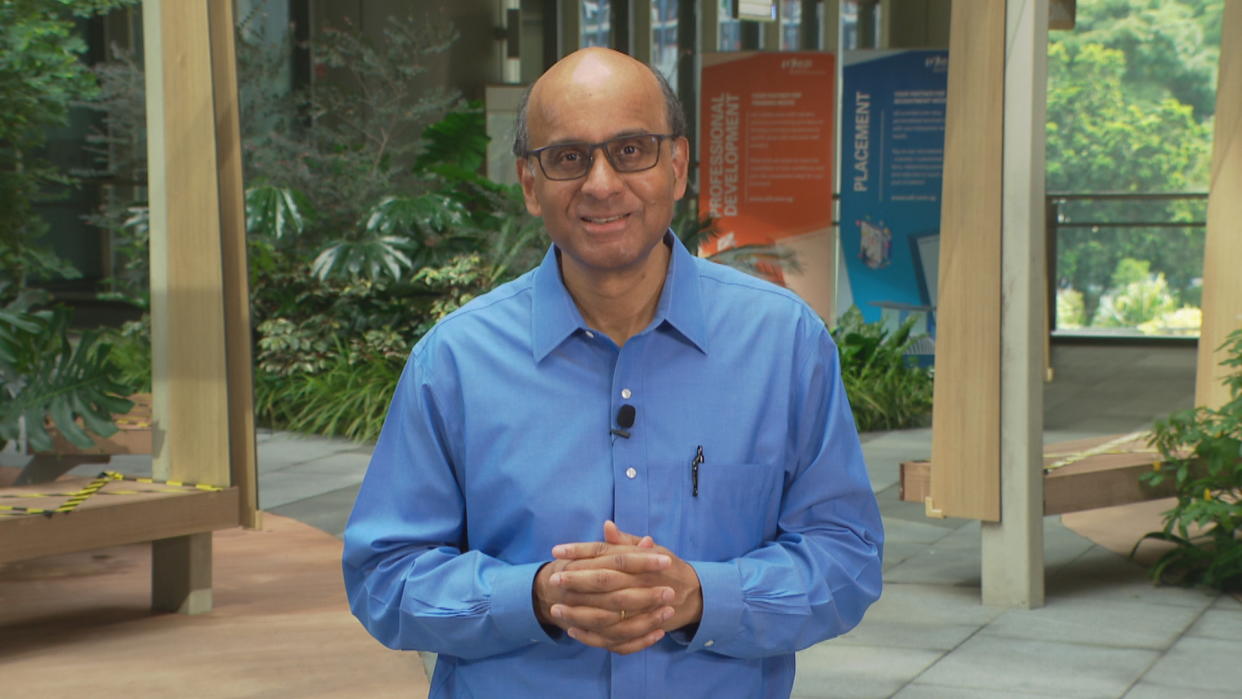Singapore must never be where ‘pedigree and connections count more than ability and effort’: Tharman

SINGAPORE — Singapore must never become a society where “social pedigree and connections count for more than ability and effort”, said Senior Minister Tharman Shanmugaratnam on Wednesday (17 June).
The COVID-19 pandemic has caused not just an economic recession but also worsened social divisions in many countries, said Tharman, who is also Coordinating Minister for Social Policies.
“All this is sharpening feelings of helplessness, and the sense that the system is stacked against those who are already disadvantaged. And it is bringing long-standing perceptions of racial injustice to a boiling point,” he added.
Delivering a 20-minute speech televised on regional broadcaster CNA, Tharman said that while Singapore cannot avoid the global economic downturn, it “must absolutely defy” the loss of social cohesion and despair taking hold in many other countries.
“Never think these trends cannot take hold in Singapore. There are many societies which used to be cohesive, but are now fragmenting, both in the West and in Asia.”
He stressed that the government will redouble efforts to strengthen Singapore’s social compact by ensuring everyone has full opportunity to do well for themselves and boosting support for the disadvantaged,
Tharman’s speech is the fifth in a series of national speeches delivered by Cabinet ministers, following those by Prime Minister Lee Hsien Loong, National Development Minister Lawrence Wong, Senior Minister Teo Chee Hean and Trade and Industry Minister Chan Chun Sing.
The last speaker, Deputy Prime Minister and Finance Minister Heng Swee Keat, is scheduled to address the nation on Saturday.
Equal opportunities, social mobility
Singapore’s society has been able to transform itself through social mobility and allowed generations of children from humble backgrounds to move up in life, Tharman noted.
“Even today, Singaporeans who grow up in lower-income families have a better chance of moving up the income ladder than those in most other advanced countries.”
But there is nothing natural or pre-ordained about social mobility, he stressed, with every successful country finding it more difficult to sustain it with time.
“Parents who themselves had higher education or who have become better off are investing more in their children, and moving them further ahead of the rest. It therefore requires relentless government effort, quality interventions in schools, and dedicated networks of community support to keep social mobility alive,” said Tharman.
The government is investing much more into equalising opportunities. For instance, Tharman cited the expansion of KidSTART a programme for children from low-income families, the upgrading of the preschool profession, and the setting up of the National Institute of Early Childhood Development
These efforts will ensure that children will have a good start regardless of which preschools they go to.
Tharman noted that teachers here have made great effort to help students from poorer homes and those at risk, to ensure they did not fall behind during the recent circuit breaker period.
The Ministry of Education has also been allocating extra resources to schools for students from disadvantaged backgrounds through the hiring of more teachers, allied educators, student welfare officers, and teacher-counsellors.
Tharman also pointed out that Education Minister Ong Ye Kung has been accelerating plans to equip all secondary school students with a personal laptop or tablet for learning, and by next year, they will have their own device, seven years ahead of the original target.
“When you add up all we are doing, starting from the earliest years of childhood, we are making a determined effort to keep Singapore a place where every individual can do well, regardless of their starting points.”
Culture of solidarity
Tharman noted that the culture of solidarity has been on display during the COVID-19 crisis as Singaporeans from all walks of life stepped forward to support those who were most affected.
Such community efforts complement the government’s social support schemes to help Singaporeans through the crisis, he added.
“No one can tell what world will emerge when COVID-19 is over, or whether it has entered a long period of economic stagnation as many fear. But we will do all we can to make ours a more cohesive society, and do it in ways that can be sustained into the next generation,” said Tharman.
Everyone has a role to play to boost the culture of solidarity so that Singaporeans have each other to rely on through the good and bad times.
Tharman added, “Every individual must put in the effort to achieve their fullest potential. But we must also take responsibility collectively, to help people bounce back from life’s inevitable setbacks, and make sure no Singaporean is left behind.”
Stay in the know on-the-go: Join Yahoo Singapore's Telegram channel at http://t.me/YahooSingapore
More Singapore stories:
Employers need ‘new thinking’ to give mature Singaporean workers ‘fair chance’: Tharman
2 Singapore residents among 247 new COVID-19 infections; 5 community cases
COVID-19: Phase 2 reopening to start on Friday, social groups and household visitors capped at 5
COVID-19: Retail businesses can reopen physical outlets on Friday with safety measures in pla



